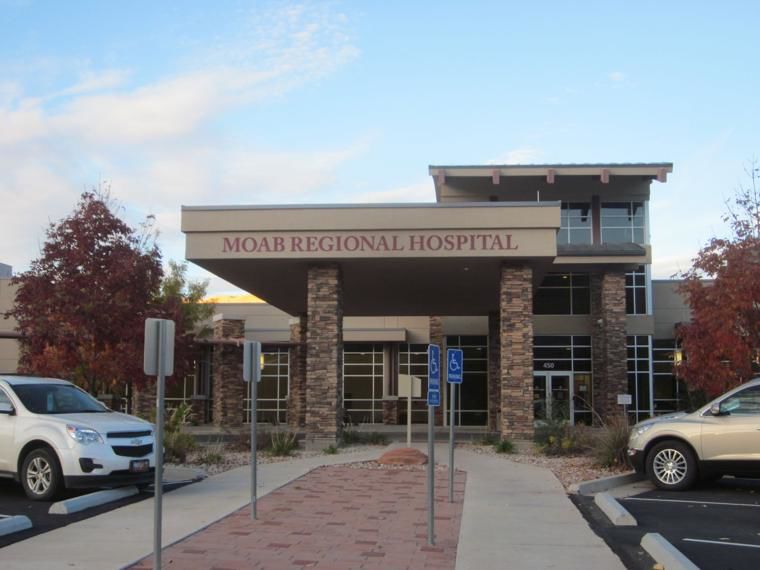Moab Regional Hospital is welcoming new staff to its team and adding to the service it provides to residents.
Every three years, Moab Regional Hospital (MRH) conducts a Community Health Needs Assessment through resident surveys, focus groups, and data from the Southeastern Utah Health Department.
The hospital’s 2016 assessment led to three prioritized concerns within the community: alcohol and substance abuse, mental health issues, and access to care. MRH has been working on strategies and goals for addressing these concerns.
Dr. Lauren Prest fits the bill for two of those goals. Dr. Prest is a psychiatrist with experience in addiction medicine. She completed a fellowship in addiction psychiatry at the University of Utah and specializes in treating opioid addiction. Dr. Prest will be a full-time physician at MRH, providing in-person psychiatric services previously unavailable in the region.
This expertise is in high demand for a reason.
According to the National Institute on Drug Abuse, in 2017 there were 15.5 drug overdose deaths per 100,000 people in Utah, a total of 456 deaths. That was higher than the national average. 70% of those overdoses involved prescription opioids.
“We were skeptical that we would be able to recruit a psychiatrist,” said Jennifer Sadoff, CEO of MRH. “It is the second most highly recruited physician and there is a significant shortage.”
That data comes from a 2017 study conducted by Merritt Hawkins, a healthcare consulting and recruitment firm.
“We were incredibly excited when she decided to join our team because she literally could have gone anywhere she wanted to go,” Sadoff said.
Dr. Prest is also looking forward to soon beginning her work in Moab.
“All communities tend to share similar challenges when it comes to mental illness, poverty, violence, substance use: real problems that Moab faces as well,” she said. “I can see that this community really looks after one another and makes a concerted effort to connect, support, and protect one another.”
Moab Regional Hospital will also be welcoming Dr. Kimberly Franke, an orthopedic surgeon, and Dr. Russell Beecher, a pain specialist.
Dr. Franke will help address the issue of access to care. In a recreation destination like Moab, a lot of hikers, bikers, climbers, rafters, and jeepers end up visiting the hospital. This creates a high demand for the treatment of strains, sprains, and fractures of bones, joints, ligaments, tendons, and muscles. She will be the hospital’s second orthopedic surgeon.
“Many of the injuries that are treated in our emergency room require an orthopedic surgeon,” Sadoff explained. “With only one available, that meant many people had to be transferred, as it’s not realistic to have full-time coverage with one physician.”
Dr. Franke’s residency was focused on trauma, and she is particularly interested in shoulder and elbow surgery. Even with the addition of Dr. Franke, however, MRH still won’t have full-time coverage for orthopedic surgery.
“It’s really not realistic to have full-time coverage until there is a minimum of three people providing call and even that is challenging on a physician’s work/life balance,” said Sadoff.
Though some patients have to be transferred to other care centers, MRH is a very advanced facility for a small town, according to Sadoff.
“We are very robust for a rural hospital in the diversity of specialties available, the number of medical staff, and the breadth and depth of technology,” said Sadoff, noting that the emergency room does have a physician on staff twenty-four hours a day, every day of the year.
Dr. Russell Beecher will be joining MRH as a visiting physician. On his website, Dr. Beecher describes his approach to pain diagnosis and treatment as “function-focused, non-surgical.” He also notes that he employs “tools to help individuals control their pain while minimizing the need for narcotics or surgical interventions.”
In another goal outlined in the plan, Moab Regional has announced that it is dedicated to removing cost barriers to healthcare access.
“We just made it easier to apply for our financial aid program, and I would encourage anyone who is having difficulty paying a bill to do so,” said Sadoff. “As a non-profit, part of our mission is to provide necessary services regardless of a patient’s ability to pay.”
Uninsured patients can receive an automatic thirty-nine percent discount, and patients can also apply for financial aid whether or not they carry insurance.
Sadoff said the hospital will continue to grow and respond to community needs. The next goal on the horizon is an addition to the medical office building, which Sadoff said she hopes will be completed sometime in 2022. With more space, MRH would be able to expand its team of specialists and physicians, open a methadone clinic and expand urgent care hours.
“There are still a lot of details to be worked out, but we are optimistic that the project will move forward,” Sadoff said.
For more information on appointments, referrals, and hospital policy, call 435-719-5500
For more information on appointments, referrals, and hospital policy, call 435-719-5500




